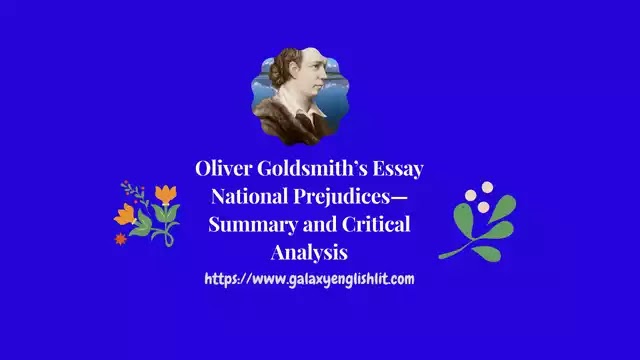Introduction:
In the essay entitled "Judicious Flattery", the writer describes about judicious and injudicious flattery. He observes that judicious flattery does not offend the feeling of man and it is pleasure - giving. One, who flatters in judicious way, always remembers what is good or bad. But an injudicious flatterer, for fear of being called a flatterer, talks about the unpleasant things. In the present essay, the writer also describes the nature and tendency of the flatterers. He presents the different kinds of species of the flatterers. In this modern world, he shows great inclination of the people towards the flatterers and flattery. The people are great fond of having the flatterers. In this physical life, the flatterers perform a vital role in different spheres.
 |
| Richard Steele’s Essay Judicious Flattery: Summary and Critical Analysis |
Summary of the Essay:
One morning the writer met a familiar person. When he saw the writer, he was overwhelmed with joy and told him that even after forty years, he (the writer) looked same. The familiar person could see no change in his physical appearance. But his inward appearance was entirely changed. He told the writer that he was not that man with whom he visited at Lady Brightly’s. He regretted over those bygone years or times when everything was different. He asked the writer if he knew any creature with whom they conversed and he was still alive. He started recollecting many inconsistent circumstances. By depicting those circumstances, he wanted to make him please. But the old circumstances, instead of pleasing the writer, showed a contrary impact upon him. The words of his flattery which were related to his appearance were not offensive, but his injudicious mention of many familiar persons, with whom they had spent a long time, recalled many things to his memory. These old recollections forced the writer to meditate upon his present condition with regret. If the old acquaintance had been judicious, he would not have reminded the writer the old things. But, he was an injudicious flatterer. He did not ask the writer about his present life nor did he welcome the writer heartily. He was only digging the past affairs. The familiar person did not mention about his and writer's old age. He could express his happiness and thanks that the writer and he were leading a happy life and their old age was going on smoothly. Both of them could walk firmly, eat heartily and converse cheerfully. All these things could make the writer happy, but the familiar person did not talk on this topic. When the writer talks about the whole human species, he finds that these injudicious people are indeed shock - giving. They never make judicious flattery. They start talking in ordinary way and think that their topic is satisfactory. But, they fear test they should be blamed of doing flattery, they at once change their normal topic and begin to remind the people the past things. They do not hesitate to go in the bottom of the last happening and present everything related to the past. This thing makes the persons very upset. It also irritates them. The writer observes that there is a cry of distress among the people against the flatterers. They think that good flatterers are very few in number. The art of flattery is the best art. This art does not need any preparation.
A man of strict nature or of a high office likes flattery of that man who does not possess any important qualities, but he is an embodiment of imperfections. The flatterer can get the company of the man of firm nature. The man of superior nature ignores the defects of his inferior. Such kind of flatterer appreciates the qualities of his superior and after hearing words of flattery; the man of superior nature is forced to examine himself and feels proud. The flattery creates or produces the feeling of superiority. When the writer observes, he finds hardly a rich man in the world who leads his life without flatterer. The rich man is also surrounded with a friend who is a good flatterer and the rich man loves him due to meaninglessness and humbleness. The species of flatterer is of great use. It provides great comfort. The flatterer is such servant who is ever ready to attend the service of his superior without any invitation and call. Whenever a man feels great want of someone for help, the flatterer comes to help. Indeed the flatterer is of great use at the times of emergency. He is the best companion in the moment crisis or tension. He provides relief through his flattery. A flatterer is a companion of loneliness. These flatterers perform their duty very well. These flatterers frequently visit many families and bring cheerfulness for the family members through their flatteryful talks. They are very benefactors to the rich. The flatters are not the doctors who write the prescription for their patients in order to relieve them from their sickness, but in other words they are the best doctors and medicine because they, with their pleasureful company, keep happy their patients. Whenever they are called, they attend the persons as doctors. They have information of the affairs of the town. They also know the general characters of the persons and by this means, they sometimes tell the most agreeable falsehoods which are worth praising. They present imaginative things. They appreciate the persons by presenting the things of the other party. In order to win your heart and favour, they mention some imaginative things and persons. Giving reference to some familiar persons, they tell you that those persons praise your qualities and they have great respect for you. The cunning flatterer, instead of flattering his superior, passes his time in his own company and in this way, he takes advantage of his flattery over his superior. Such cunning flatterer knows it very well that none can report against him to his superior.
The cunning flatterer knows that if some error is committed, his other companions working in the same office who are ever busy in their work and who are talented, will be rebuked by the chief of the office because the talented get less freedom to pass their time than the cunning flatterer. A flatterer always approves his superior. He never opposes the ideas brought by his superior. He always praises the deeds performed by his superior. He shows his great liking for what his superior proposes. He is also great fond of begging pardon. If the superior blames himself for the error committed by him, the flatterer soothes his wounded feeling and tries to assure his superior that he is right. He is not ready to accept that his superior can commit any error. An old lady rarely lives without such a companion. She likes to have such a flatterer who can repeat the names of her lovers and those suitable boys with whom she refused to marry in the days when she was at the summit of her youth and beauty and was also full of the feelings of proud. She likes if someone recalls the days of her youth. It is to be noted that a woman's flatterer is generally older than herself. The writer says that the gentlemen like him are extremely poor in this matter. The writer has also one flatterer who oftenly smokes with him, but he is not so much talented in the matter of flattery. He does not praise the writer so much as he deserves. The main purpose of his praises is to fill his smoke pipe with the help of the writer. When his smoking is over, he stops flattery. He is capable of praising the writer only for filling his pipe, though the writer spends many hours in his company but in vain. The writer says that it is difficult to present an account of this inclination to be flattered. The writer observes that if we go to the bottom to get the detailed particulars about the flattery and flatterers, we find that flattery is the return of that money which is invested in a business to earn more. As we feel happy after getting the money, the same pleasure we derive from flattery. Every man dreams of having an empire of his reputation and when he sees that his flatterer is bringing that fame by praising him and convincing others about his qualities, he feels happy. It is no matter how an unhealthy mind a flatterer has and by what means he brings money and fame. After being pleased with the flattery, the man begins to believe on the sincerity of the flatterer. Those who are absurd creatures are skilled in the art of flattery. Their want of ability is here an advantage and their bluntness is the seeming effect of sincerity. It also covers their cunning trick. The writer gives an example of a flatterer talking to a foolish dandy. The flatterer cheats the dandy. A third person on the stage makes on him a pleasant remark that the flatterer knows an art of making fool. The great men and the men of having superiority or high merits love flattery. They are great fond of having flatterers. This fondness is called their weakness. A fool remains fool until he is made feel of his superiority by a flatterer. The flatterer praises him whether is worth praising or not and afterwards the fool does not remain merely a fool, but becomes a man of dignity. The writer remembers a jester who, upon a saying “that time is so difficult that there must great care be taken what one says in conversation,” answers that this saying has no mean until the people are not free from the circle of the flatterers. Mostly men want to listen the praise from others because they cannot endure the truth. The truth is full of bitterness. Indeed flattery is very harmful. It makes a man happy, but gives his also a great loss. Flattery conceals the weaknesses of a man and does not provide him opportunity to flourish. The writer says that the flatterer is the meanest person.
Critical Analysis of the Essay:
Introduction:
In the essay entitled "Judicious Flattery", the writer has depicted about judicious and injudicious flattery. He tells that judicious flattery leaves pleasing impact whereas injudicious flattery makes unhappy to the people. He also mentions nature and tendency of the flatterer. The writer introduces different kinds of species of the flatterers who perform their duty in different way. He observes that in this modern world the people are greatly fond of having flatterers. The flatterers are the best companions of the rich and the distinguished people. They create the atmosphere of happiness among the members of the family. In the essay, the writer also mentions about the flatterer of the old lady. The old lady inclines towards flattery because she expects from him the glorious praising of her youth and beauty and when she hears the description of her youth, she becomes overjoyed.
Thought - Content:
In this essay, the writer meets an old familiar who start talking about the past things. He reminds the writer many unpleasant things which disturb him. The familiar person does not talk about the present condition of the writer. In this way, he makes injudicious flattery which can disturb the mind of anyone. In writer's opinion such kinds of injudicious flatterers start talking in ordinary way , but for fear of being blamed of doing flattery, they at once change their normal topics and begin to remind the people the unpleasant things. Next the writer tells us that the men of firm nature and high office like those flatterers who do not possess any important qualities. The writer finds hardly a rich man in the world who leads his life without flatterer. The flatterer is such servant who is ever ready to attend the service of his superior without any invitation and call. The cunning flatterer, instead of flattering his superior, passes his time in his own company and in this way; he takes advantage of his flattery over his superior. Such cunning flatterer knows it very well that none can report against him to his superior. A flatterer always approves his superior. He never opposes the ideas brought by his superior. The old lady likes to have such a flatterer who can repeat the names of her lovers and those suitable boys with whom she refused to marry. Some flatterers come only to fulfil their purpose. Those who are absurd creatures are skilled in the art of flattery. Their want of ability is an advantage and their bluntness is the seeming effect of sincerity. The great men and the men of having superiority or high merits love flattery. They are great fond of having flatterers.
The Effects of Injudicious Flattery:
The injudicious flatterers talk about unpleasant aspects of life. They do so because they fear lest they should be blamed of doing flattery. They do not hesitate to go in the bottom of the last happening and present everything related to the past. This thing makes the person very upset. It also irritates them. The writer observes that there is a cry of distress among the people against the flatterers. They think that good flatterers are very few in number.
The Use and Importance of the Flatterers:
The species of flatterer is of great use. It provides great comfort. The flatterer is such servant who is ever ready to attend the service of his superior without any call. Whenever a man feels great want of someone for help, the flatterer comes to help. Indeed the flatterer is of great use at the time of emergency. He is the best companion in the moment of crisis. He provides relief through his flattery. A flatterer is a companion of loneliness. These flatterers frequently visit many families and bring cheerfulness for the family members. The flatterers are the best doctors and medicine because they, with their pleasureful company, keep happy their patients.
Harmful Effects of Having Flatterers:
The fondness of having flatterers is called the people's weakness because they become habitual of their praising. A fool remains fool until he is made feel of his superiority by a flatterer. The flatterer praises him whether he is worth praising or not. Mostly people want to listen their praise from others because they cannot tolerate the truth. Indeed flattery is very harmful. It is the greatest hindrance in the way of prosperity. Under the influence of flattery, man cannot make his upliftment because his faults and shortcomings are suppressed and the flatterers do not give him the opportunity to improve their wrong doings. Their wrong doings also get the covering of excellent job through the praise of flatterers. Flattery conceals many weaknesses of man.
Style and Language:
Steele is not a stickler for perfection of style. He is free from the professional author's obsession with correctness and cultivated quality of expression. He establishes a friendly relationship with his reader. The essay has an effusiveness of conversation about them. He is often not too careful about the construction of his sentences. He is free from any kind of pedantry. In the essay, we find an ease and flow, symptomatic of conversation. His style shows warmth, sincerity of conviction, naturalness and spontaneity which makes up for any lack of correctness of writing, any lack of elegance or purity in writing.





